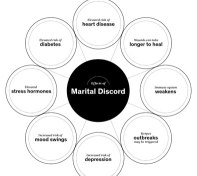A recent article by Tara Parker-Pope with the New York Times took a closer look at what scientists have consistently found to hold true after decades of research: the fact that married people, on average, appear to be healthier and live longer than unmarried people. But with more and more couples choosing to co-habitate longer and forgo that walk down the aisle, how does their health ultimately fare? And what about those marriages that eventually end in divorce?
New studies have shown that single people are healthier than those in dysfunctional relationships as well as those that were married but later got a divorce. Several epidemiological studies have suggested that unhappy marriages may bring about an increased risk for heart attacks and cardiovascular disease. By and large, what these studies are beginning to show is that the quality of the relationship has a greater impact on health than entering into the institution of marriage. From the way couples argue and work through conflicts to the level of emotional support; if these needs are not being met, their health and well-being is at risk.
All couples have conflicts, but if they are unwilling to work on improving their relationship, either through seeking counseling or self-study(psychoeducation), it may often be the case that being single is a much better choice, mentally and physically, than to remain in a bad relationship.
To read the complete article, click here.
Shrein Bahrami, MFT | 2146 Union Street, San Francisco, CA 94123 | 415.595.8963
Tags: marriage, single, relationship, heart attacks, new york times, psychoeducation, counseling

